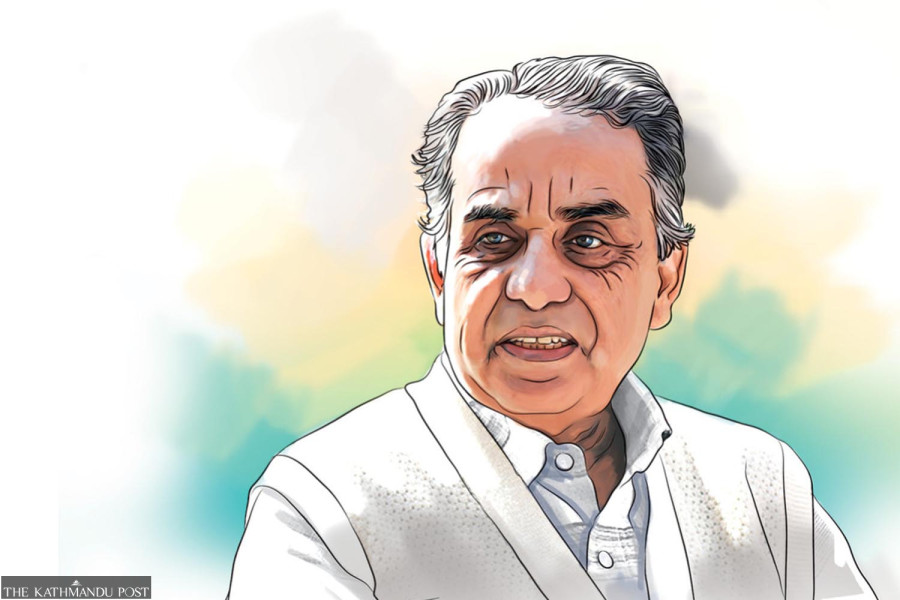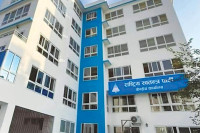Politics
Dhungana, first Speaker post-1990, champion of rights and democracy, dies
Daman Nath Dhungana set benchmark for Speakers, earned respect on both sides of aisle.
Purushottam Poudel
Daman Nath Dhungana, the first Speaker after the restoration of democracy in 1990, and a human rights defender who always stood for justice for anti-establishment forces passed away on Sunday. He was 83.
Dhungana, who was suffering from a chronic liver problem, was rushed to the Baneshwar-based Frontline Hospital after he experienced breathing problems on Sunday. Doctors pronounced him dead upon arrival at the hospital.
Dhungana was born in January 1942 in Kathmandu.
Throughout his life, Dhungana maintained a distinct identity in Nepal’s political movements. Despite being affiliated to the Nepali Congress for a long time, he didn’t confine himself within the party’s domain. He earned immense respect from other political parties and communities fighting for their rights and identity.
He joined politics as a student activist from the beginning of the Panchayat period in the 1960s and later established himself as an advocate, human rights activist, civil society leader, and politician. He became general secretary of the Nepal Bar Association in 1971. Dhungana was also a founder executive member of Amnesty International. In 1990 he served as a member of the Constitution Recommendation Commission that drafted Nepal’s constitution.
Dhungana spent five years in jail during different periods under the Panchayat regime for supporting political parties that were banned at the time for opposing the system.
He fought against the Panchayat system and for the restoration of democracy after King Mahendra abolished the parliamentary system and imposed the partyless Panchayat system in 1960, says Congress leader Arjun Narashinga KC.
“Dhungana was an intellectually towering figure who made a huge contribution to Nepali society,” former minister KC said.
Those who remember Dhungana say that his legacy cannot be captured through a single lens since he had multiple identities.
Raghuji Pant of the CPN-UML remembers Dhungana as a lawyer who advocated for democratic rights during the Panchayat regime. Later, Dhungana got elected as a member of parliament from Kathmandu-2 on a ticket of the Nepali Congress, which also won a majority in the 205-seat House of Representatives during the 1992 parliamentary polls, the first general election conducted after the restoration of democracy in 1990.
As the only Congress candidate to be elected from Kathmandu and his background as an advocate and former general secretary of Nepal Bar Association made him an ideal choice for the role of Speaker.
Dhungana thus became the first Speaker after the restoration of the democracy, and the second in overall parliamentary history of Nepal. Congress leader Krishna Parsad Bhattarai is the first Speaker in Nepal’s history as he was Speaker of the first parliament elected in 1959.
“However, Dhungana was someone who set a benchmark for Speakers in Nepal and someone who could be consulted on Parliamentary affairs,” lawmaker Pant told the Post. “Despite being from the rival political party, we alway respected him.”
For Pant, a phrase coined by Dhungana in the parliamentary history of Nepal is something to be cherished which is, “Parliament always belongs to the opposition party while the government is led by the ruling party.”
Hari Bahadur Thapa, a senior journalist who closely followed parliamentary affairs, believed that Dhungana’s approach to give the opposition party more space in the House made him a leader respected by all.
Thapa also says that there was a time when the Congress, the party that appointed him as Speaker, was unhappy with him for giving more space to the opposition.
Dhungana could not complete his term as Speaker after Prime Minister Girija Prasad Koirala dissolved the House and announced midterm elections in 1994 due to intra-party feud within the Congress party.
Dhungana wasn’t quite active as a party leader after the mid-term election of 1994. However, he played a key role as a civil society leader in the people’s movement in 2006. Dhungana also played an active role in facilitating negotiations between the government agencies and mainstream political parties with the erstwhile rebel Maoists. He was one of the key mediators while signing important agreements between mainstream political forces and Maoists.
In 2017, after a 23-year gap from active party politics, Dhungana contested the parliamentary election from Bhaktapur-2 on a Congress ticket, but did not win.
In an interview with The Kathmandu Post in August last year, Dhungana had said that Nepalis brought about radical political changes but didn’t learn how to run the democracy responsibly. “As successive governments have failed to deliver, those who want to undo recent political changes are emboldened,” he said in the interview. “A section of the intelligentsia also backs the idea. This is how multiple complications are emerging.”
Dhungana is survived by his wife Bhuwan Koirala, two sons, and a daughter. According to family sources, he will be cremated on Monday after one of the sons Nimesh Dhungana who is in Britain returns. His other son Nishesh and daughter Nikita are in Nepal.
Tributes pour in
Top politicians, members of the intelligentsia and rights activists, among others, have paid tributes to Dhungana and expressed condolences to the bereaved family members.
President Ramchandra Paudel said he was shocked by the news of Dhungana’s death. “The contribution made by Dhungana to the democratic movement as a politician, senior advocate and a civil society leader will always be remembered,” the Office of the President wrote on social media platform X on Sunday.
Prime Minister KP Sharma Oli expressed his sadness and wrote on Facebook: “I recall his remarkable contribution to the human rights movement and promotion of parliamentary democracy in Nepal.”
Finance Minister Bishnu Prasad Paudel said “Dhungana’s death caused irreparable loss to the country’s democratic movement.”
Akhilesh Upadhyay, former editor-in-chief of The Kathmandu Post, remembers Dhungana as arguably Nepal's best Speaker to date.
“Much respected by the opposition- UML, NWPP, Sadhavana, etc. But Nepali Congress heavyweight and then-prime minister Girija Prasad Koirala disliked him; Dhungana refused to entertain GPK's partisan interests,” Upadhyay wrote on X. “History will be kinder. RIP.”




 12.58°C Kathmandu
12.58°C Kathmandu















